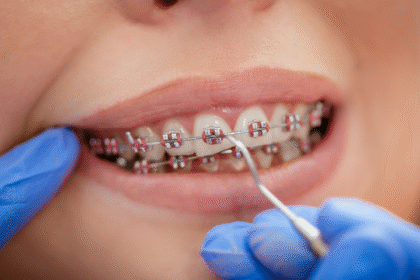Have you ever woken up with a sore jaw, a headache, or teeth that feel oddly sensitive? If so, you might be grinding your teeth at night without even realizing it. This condition, known as bruxism, is more common than you may think. Studies suggest that up to 8–10% of adults and around 15% of children experience teeth grinding, especially during sleep.
The tricky part is that most people don’t notice it themselves. Instead, a bed partner might hear the grinding, or a dentist may spot the wear and tear on your teeth. At 65 Broadway Dental in NYC, we often see patients who are surprised to learn that their unexplained jaw pain or morning headaches are linked to nighttime grinding.
The good news is that you don’t have to suffer in silence. With the right approach, you can learn how to stop teeth grinding at night and protect both your smile and your sleep quality. In this guide, we’ll dive deep into why teeth grinding happens, what it does to your body, and most importantly, real solutions that actually work—so you can wake up feeling refreshed and pain-free.
What Exactly Is Teeth Grinding?
Teeth grinding, or bruxism, is an involuntary clenching, grinding, or gnashing of the teeth. While it can happen during the day, it most often occurs at night while you’re asleep. Unlike chewing food, this grinding serves no purpose and can cause significant strain on your teeth and jaw.
There are two types:
- Awake bruxism: Clenching or grinding during the day, often linked to stress or deep concentration.
- Sleep bruxism: Grinding at night, usually harder to detect because you aren’t aware of it.
Sleep bruxism is considered a sleep-related movement disorder, and it’s often linked to other issues like snoring or sleep apnea.
Why Do People Grind Their Teeth at Night?
The exact causes of bruxism aren’t fully understood, but research points to several factors:
- Stress and Anxiety: Emotional tension is one of the leading triggers. People under pressure are more likely to clench or grind in their sleep.
- Sleep Disorders: Those with conditions like sleep apnea, snoring, or insomnia are at a higher risk.
- Bite Problems: Misaligned teeth or an uneven bite can sometimes contribute.
- Lifestyle Habits: Caffeine, alcohol, smoking, and even certain medications can increase the likelihood of grinding.
- Age: Children are more likely to grind their teeth, but often outgrow it.
Think of bruxism as your body’s way of releasing tension, just not in a healthy direction.
The Hidden Dangers of Nighttime Teeth Grinding
It may not sound serious at first, but grinding your teeth night after night can cause long-term damage. Some of the biggest risks include:
- Tooth Damage: Worn enamel, chipped teeth, and increased sensitivity.
- Jaw Pain: Constant clenching stresses the jaw muscles, leading to pain or clicking sounds.
- Headaches: The pressure radiates into the temples and causes morning headaches.
- TMJ Disorder: Over time, grinding can contribute to temporomandibular joint (TMJ) problems.
- Poor Sleep Quality: Disrupted sleep can leave you feeling tired and irritable.
Dentists often say they can “see stress on your teeth” because bruxism leaves clear signs. Catching it early makes treatment easier and helps prevent permanent damage.
How to Stop Teeth Grinding at Night
Now comes the most important part: figuring out how to stop teeth grinding at night. The best approach usually combines lifestyle changes, relaxation techniques, and professional dental care.
Stress Management and Relaxation
Since stress is one of the leading causes, finding ways to relax can make a big difference. Practices like meditation, yoga, journaling, or even a simple breathing routine before bed can calm your mind and body. Reducing screen time in the evenings and setting a consistent sleep routine also helps your brain switch into “rest” mode.
Adjusting Lifestyle Habits
Certain daily habits can make grinding worse. Cutting back on caffeine, especially in the afternoon, avoiding alcohol late at night, and quitting smoking all reduce stimulation that can trigger grinding. Even chewing gum excessively during the day can overwork the jaw muscles, making them more likely to clench at night.
Protecting Your Teeth with a Night Guard
For many people, a custom night guard is the single most effective way to stop damage from bruxism. A night guard is a dental appliance that fits over your teeth, creating a cushion that absorbs the pressure from grinding. It doesn’t cure the cause, but it protects your enamel and relieves jaw strain.
Over-the-counter guards exist, but they often feel bulky and don’t fit as well. A dentist-made guard, though more costly, provides comfort and durability that’s worth the investment.
Correcting Bite Problems
If grinding is linked to a misaligned bite or crooked teeth, dental treatments like braces, Invisalign, or reshaping the biting surfaces may help. Your dentist can guide you on whether this is necessary.
Medical Treatments and Therapy
In severe cases, doctors might recommend additional approaches:
- Botox injections in the jaw muscles to reduce clenching force.
- Physical therapy to improve jaw alignment and reduce pain.
- Medication review, since some drugs (like antidepressants) can increase bruxism risk.
Natural and Home Remedies
If you’re looking for gentle, at-home approaches, there are options that may ease nighttime grinding:
- Warm compresses on the jaw before bed to relax muscles.
- Magnesium supplements to support muscle relaxation.
- Mouth relaxation exercises to train your jaw not to clench.
- Staying hydrated, since dehydration has been linked to increased grinding.
While these remedies may not completely stop bruxism, they can reduce its intensity and complement professional care.
What Happens If You Don’t Treat Teeth Grinding?
Ignoring bruxism can lead to a cycle of damage that only gets worse. Many patients don’t realize the grinding until their teeth start flattening or cracking. Restorative dental work, like crowns, veneers, or even implants, may eventually be needed to repair the damage. That’s why acting early is key. The sooner you learn how to stop teeth grinding at night, the less likely you’ll be to face expensive, long-term repairs.
When to See a Dentist
If you notice chipped teeth, jaw soreness, morning headaches, or if someone tells you they hear grinding noises, it’s worth booking a dental checkup. A dentist can identify early wear patterns and suggest a night guard or other treatments before the problem escalates.
Also Read: https://bizdirectoryhub.com/discover-the-best-dental-hospitals-in-islamabad-for-exceptional-care/
Conclusion
Teeth grinding at night might feel like something out of your control, but with the right mix of self-care and professional guidance, you can break the habit and protect your smile. Start by addressing stress, adjusting lifestyle triggers, and considering a custom night guard for protection.
Remember, your teeth are meant to last a lifetime. By taking action today, you’re not just improving your sleep; you’re safeguarding your long-term oral health.
So the next time you wonder how to stop teeth grinding at night, know that the answer lies in a proactive approach. A calm mind, healthy habits, and dental support can truly make all the difference.



